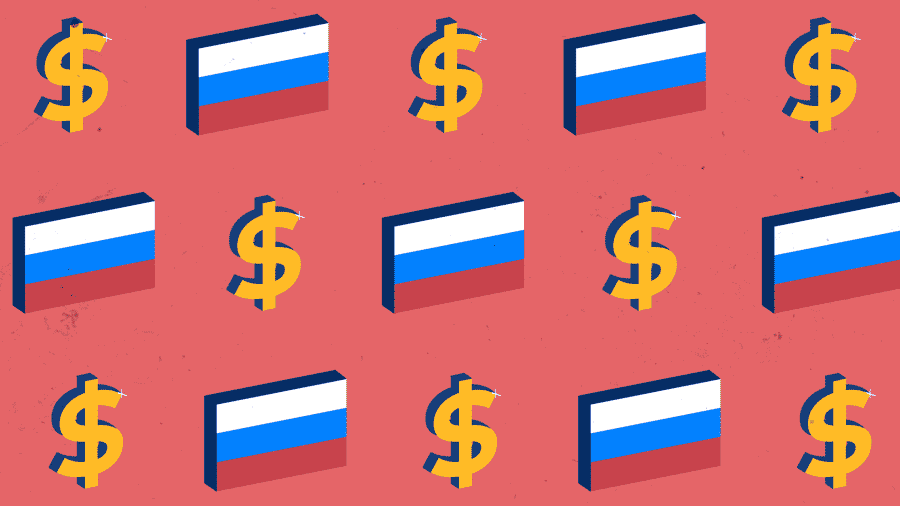About six years ago, a number U.S. venture investors were bullish about Russia’s startup scene. Well-known VCs like Accel and Intel Capital led rounds for emerging Russian Internet brands. Cisco also targeted the region, backing a fund focused on Russia and Eastern Europe. In 2012, the peak year for cross-border deals, U.S. VCs backed nearly 50 rounds for Russia-based startups.
Follow Crunchbase News on Twitter & Facebook
But that was then. More recently, U.S. investment in Russian venture deals has slowed to a halt. No Russian startups have disclosed venture rounds with U.S. investors so far this year, according to Crunchbase data. Most of the big name firms active early in the decade haven’t done a new deal in years.
There are plenty of developments in recent years to dampen U.S. investor enthusiasm. Their exodus coincides with the imposition of U.S. and European sanctions tied to Russia’s military interventions in Ukraine. It also coincides with the beginning of a protracted collapse for the Russian ruble, tied to sanctions as well as falling oil prices. During that time, Russia’s economy also slipped into recession.
Yet while it may be explicable, the shift in U.S. investment is nonetheless dramatic, and it contrasts with patterns for Russian VCs investing into U.S. startups. As we reported last week, Russian investment in U.S. startups has fallen from peak levels, but still numbers a few dozen deals a year, roughly half peak levels.
To put some perspective on the state of U.S. venture investment in Russia, we take a look below at the brief history of deal-making, touch on major investments, and look at the current funding environment.
How It Was
There was a time when U.S. venture firms found much to like about a new generation of Russian Internet startups emerging as regional category leaders.
During the peak two years for cross-border investment, U.S. investors participated in at least 82 funding rounds for Russia-based startups, according to Crunchbase data. The largest funding recipients were principally Internet companies, including fashion e-tailer KupiVIP, online used car broker CarPrice.ru, and classified ad platform Avito.ru.
As mentioned, prominent venture firms participated in many of these financings. Intel Capital, the largest U.S. corporate VC, was an investor in ten funding rounds for Russia-based companies between 2010 and 2014, according to Crunchbase data. (Since then, it’s done zero.) Accel backed large rounds for three of the most heavily funded internet companies: hotel booking site ZenHotels, along with KupiVIP and Avito. (Avito later sold a majority stake to Naspers in 2015 for $1.2 billion.) Other well-known U.S. firms that did one or more deals include Bessemer Venture Partners (KupiVIP, Enforta) and Summit Partners (Lamoda).
Perhaps the most active, and one of the earliest entrants into the market, is Almaz Capital, which counts Cisco as a key backer, and has been investing in Russia and Eastern Europe since 2008. Almaz had an early hit with a 2009 investment in Yandex, the Russian language search engine. Yandex went public in 2011 and has held a market cap above $10 billion for the past few years.
In the chart below, we look at the number of disclosed funding rounds for Russian startups that included a U.S. investor, as well as the total invested in these funding rounds. (The funding totals include all investors in the round, not just U.S.-based firms.)

We also took a look at Russian startup rounds involving a U.S.-based lead investor. The number of rounds with a U.S. based lead investor peaked in 2012 and has been trending downward ever since.

Finally, we found the largest rounds for Russia-based companies with a U.S.-based lead investor.

How It Is Now
This year, U.S. investors haven’t shown much interest in Russian startups.
Crunchbase recorded no traditional venture financings into Russia-based companies with U.S. backers. The closest thing was IXcellerate, a Moscow-based data center operator, which raised $15 million in convertible debt funding from Goldman Sachs.
Investors seem a bit more interested in Russian founders who scale their startups elsewhere. Almaz, for instance, hasn’t listed any investments in Russia-based companies for a couple years, according to Crunchbase data. Currently, the firm said its strategy is to invest in promising entrepreneurs from Silicon Valley, the Baltics and Eastern Europe who “will be incorporated in western jurisdictions.”
It’s not just U.S. VCs who are investing less. The volume of investments in Russian companies that include a foreign venture or private equity backer fell by more than two-thirds from 2014 to 2016, according to the Russian Venture Capital Association.
Yet while private investors have scaled back, the Russian government’s role in startup funding has grown. In 2016, the number of investments by venture capital funds totaled 210, up from 190 the prior year, RVCA estimates, though average deal sizes have been trending lower.
A more detailed analysis shows that state entities and entities under the government’s umbrella ensure the deal flow from year to year, RVCA noted in its last annual report. In 2016, the group estimates that 28 percent of funding consisted of government money, and 45 percent through the Internet Initiatives Development Fund, a venture capital fund set up by the state.
What Next?
In the current geopolitical environment, the Russian government’s heavy involvement in the startup funding space may be a double-edged sword for founders with global ambitions.
On the one hand, state-controlled funds have provided capital at a time when foreign sources were scarce. On the other hand, startups hoping for future support from Silicon Valley and other global tech hubs might find potential backers shying away from signing on with the Russian government as a co-investor.
Illustration: Li-Anne Dias

Stay up to date with recent funding rounds, acquisitions, and more with the Crunchbase Daily.








67.1K Followers